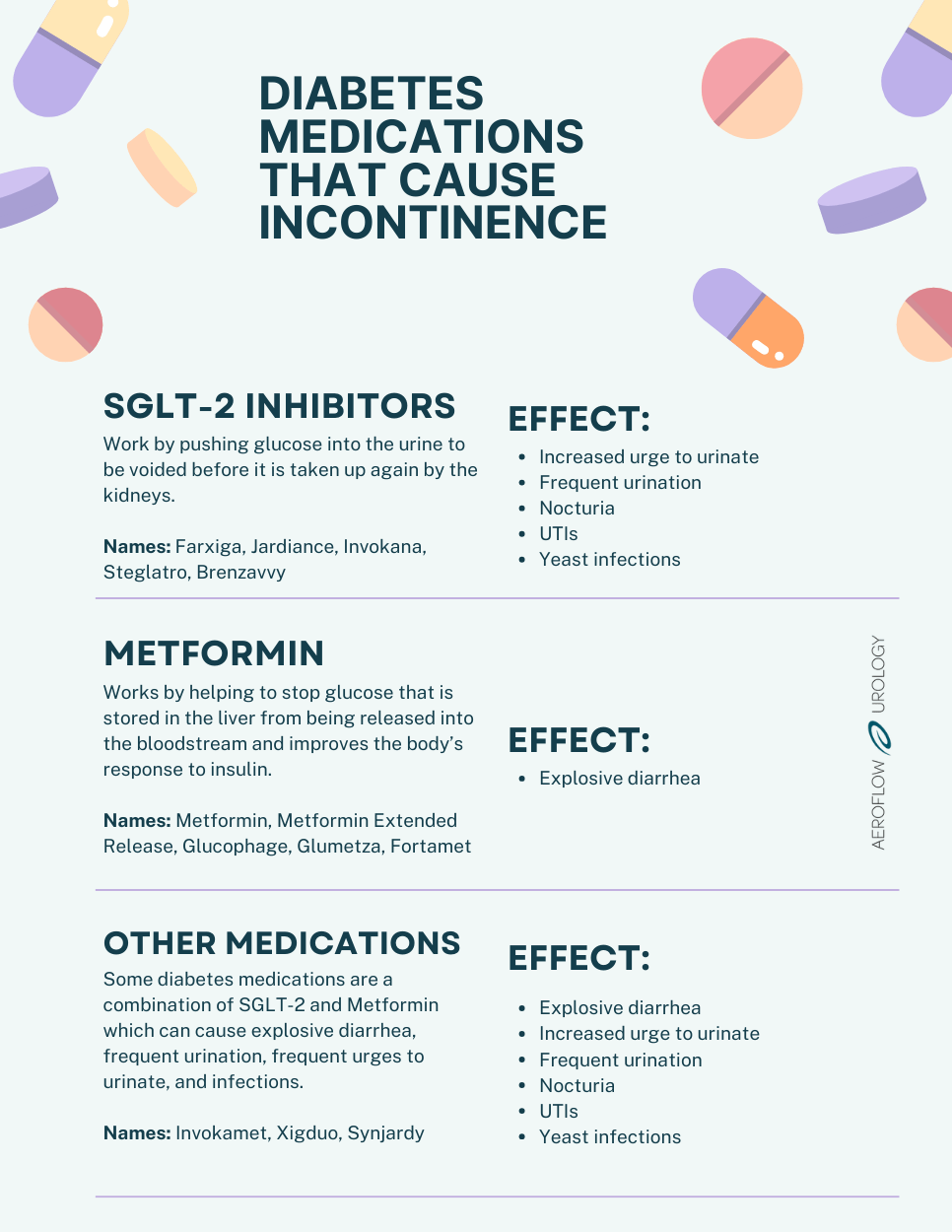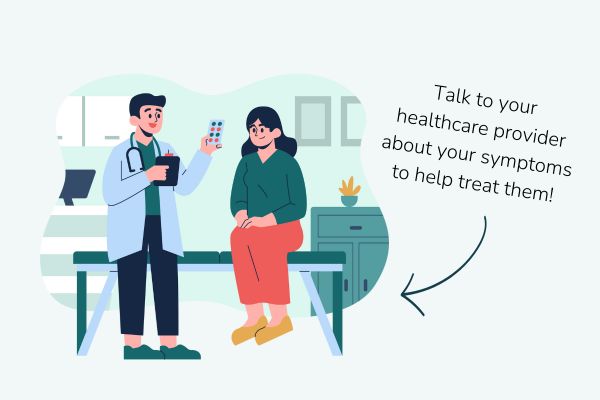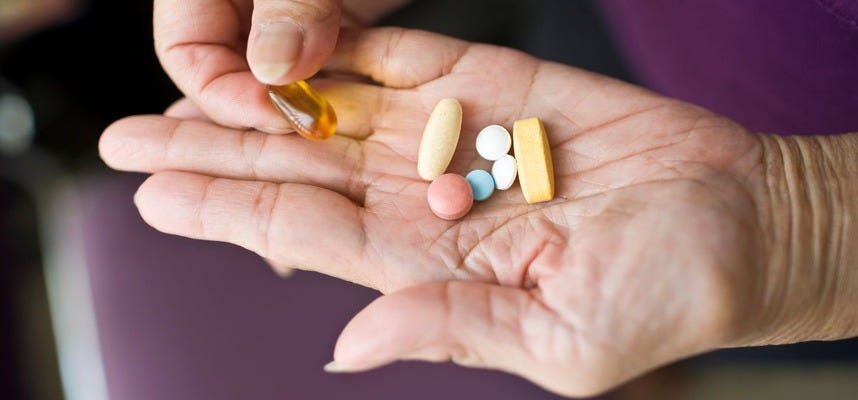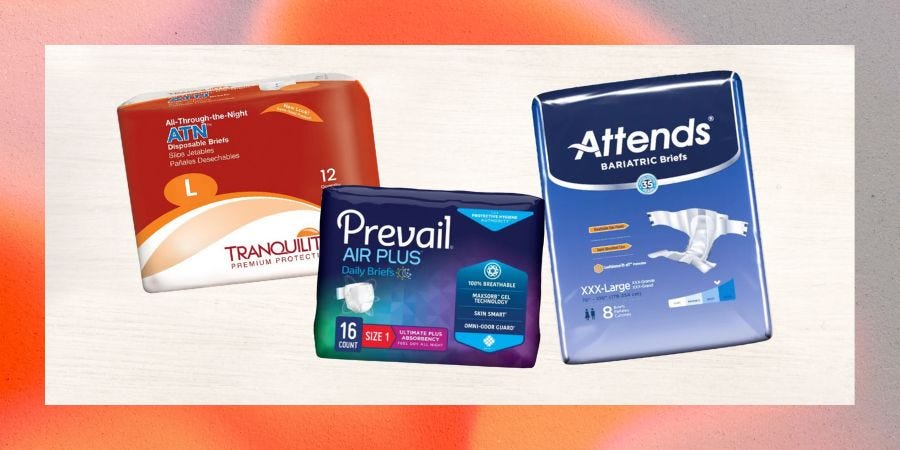Key Takeaways:
- Studies show that some diabetes medications, such as Metformin and SGLT-2 inhibitors, may cause urinary or bowel incontinence.
- Diabetes medications may also cause constipation, urinary tract infections, and yeast infections.
- There are many strategies that can be used to treat urinary or bowel incontinence.
Jump To:
Can Diabetes Medications Cause Urinary or Bowel Incontinence?
INCONTINENCE PRODUCTS THROUGH INSURANCE:
Aeroflow Urology is in-network with many Medicaid and Medicaid-managed insurance plans and is accredited by Medicaid. Complete our Eligibility Form, and we’ll automatically check to see if your plan covers incontinence supplies. ***Must meet certain requirements to qualify.***
You will also receive the care and attention every person managing incontinence deserves: A personalized list of 100% insurance-covered incontinence supplies, a dedicated Continence Care Specialist you can contact during business hours, a user-friendly online portal for easy monthly reordering, and educational content.
Get the continence care you need with the dignity you deserve. Join the Aeroflow Urology family today! It only takes 5 minutes to get started.


Check Your Eligibility
2 Easy Steps
Discover the continence care essentials available through your Medicaid plan.
While the focus of diabetes treatment is typically centered around blood sugar levels, we shouldn’t forget about the lesser-known side effects that individuals with diabetes may face.
Incontinence is an unexpected and often uncomfortable side effect of diabetes medications that some encounter.
Let’s explore the connection between these 2 conditions so you can understand and treat your symptoms.
Can Diabetes Medications Cause Bowel or Urinary Incontinence?
Individuals with diabetes already face an increased risk of bladder issues due to the condition’s ability to cause muscle and nerve damage in the bladder. Unfortunately, certain diabetes medications that control blood pressure in those with type 1 diabetes and type 2 diabetes can also cause:
- Urinary incontinence.
- Explosive diarrhea (bowel incontinence).
- Constipation
- Urinary tract infections (UTIs).
- Yeast infections
What Is Incontinence?
Urinary incontinence is the loss of bladder control. There are different types of urinary incontinence, including:
- Stress Incontinence: Leaking urine when sneezing, coughing, laughing, exercising, or lifting heavy objects.
- Overactive bladder (OAB) / Urge incontinence: Feeling the intense and sudden urge to urinate more frequently than usual, leading to increased trips to the restroom or bladder leaks.
Bowel incontinence is the loss of bowel control, resulting in leakage.
Which Diabetes Medications Cause Incontinence?
SGLT-2 Inhibitors
SGLT-2 inhibitors work by pushing glucose into the urine to be voided before it is taken up again by the kidneys.
These medications increase urine output, which is why individuals taking them experience incontinence-related symptoms, such as increased urges to urinate and frequent urination. SGLT-2 inhibitors also come with the side effect of genital infections due to the presence of glucose creating the perfect conditions for bacteria to grow.
Incontinence-Related Side Effects:
- Increased urge to urinate (OAB).
- Frequent urination (OAB).
- Nocturia
- UTIs
- Yeast infections.
Medication Names:
- Farxiga
- Jardiance
- Invokana
- Steglatro
- Brenzavvy
Metformin
Metformin is a drug class of its own and is the cornerstone of diabetes care. It works by helping to stop glucose that is stored in the liver from being released into the bloodstream and improves the body’s response to insulin.
Metformin changes the gut microbiome, which may be the cause of its main incontinence-related side effect of explosive diarrhea. It’s also been shown that individuals taking immediate-release Metformin experience more diarrhea than those taking the extended-release medication.
Incontinence-Related Side Effects:
- Explosive diarrhea (fecal incontinence).
Medication Names:
- Metformin
- Metformin Extended Release.
- Glucophage
- Glumetza
- Fortamet
Other Medications
Some diabetes medications are a combination of SGLT-2 and Metformin, which can cause explosive diarrhea, frequent urination, frequent urges to urinate, and infections.
Incontinence-Related Side Effects:
- Explosive diarrhea (fecal incontinence).
- Frequent urination (OAB).
- Increased urges to urinate (OAB).
- UTIs
- Nocturia
- Yeast infections.
Medication Names:
- Invokamet
- Xigduo
- Synjardy
How Do You Treat Diabetic Incontinence?
From lifestyle modifications and pelvic floor exercises to medical interventions, a range of strategies exist to help you or your loved ones lessen symptoms of incontinence.
- Doctor’s Appointment. The first step in treating your incontinence symptoms is to speak with a healthcare provider, diabetes specialist, or urologist. They’ll be able to guide you and make a plan to manage and treat your symptoms.
Get a list of what to ask at your first doctor’s appointment for incontinence.


2. Pelvic Floor Exercises. Regularly performing pelvic floor exercises correlates with decreased incontinence symptoms. These exercises strengthen your pelvic floor muscles (detrusor muscles) over time, reducing leakage.
Learn how to do pelvic floor exercises at home!
3. General Exercise. Physical activity can assist in weight loss in those who are experiencing obesity due to diabetes, which may decrease the risk of incontinence symptoms by reducing the amount of pressure placed on the pelvic floor.
4. Bladder Retraining. Bladder training increases the amount of urine you’re able to hold in your bladder without voiding and decreases the number of times you need to use the restroom.
Find out how to start retraining your bladder at home.
5. Dietary Changes. If you’re experiencing explosive diarrhea from diabetes medication, you may not be able to completely stop it due to the underlying cause, but there are things you can do to lessen the severity. Hydrate with clear liquids, avoid sugary drinks and caffeine, avoid foods that are highly processed, greasy, or contain dairy.
Learn about the diet changes to keep your bladder from being irritated.
6. Pelvic Floor Physical Therapy (PFPT). PFPT requires you to see a professional pelvic floor therapist for your incontinence symptoms. While it may feel embarrassing to discuss your symptoms at first, it’s worth it! PFPT can reverse incontinence in some cases.
Read what to expect at your first appointment.
7. New Medications. A different type of diabetes mellitus medication might be the solution for you if you’ve tried other treatment strategies, have spoken with a urologist or PFPT, and are still experiencing symptoms of incontinence.
Remember that incontinence is nothing to be ashamed of. It is common among people of all ages, and there are many treatment options available that will help you regain your quality of life.
References
Diabetes Medications can cause Urinary or Faecal Incontinence | ADE. (n.d.). https://ade.adea.com.au/diabetes-medications-can-cause-urinary-or-faecal-incontinence/
How Diabetes Can Affect Bladder Control - Health Encyclopedia - University of Rochester Medical Center. (n.d.). https://www.urmc.rochester.edu/encyclopedia/content.aspx?ContentTypeID=56&ContentID=DM221
Yang, H., Choi, E., Park, E., Na, E., Chung, S. Y., Kim, B., & Han, S. Y. (2022). Risk of genital and urinary tract infections associated with SGLT‐2 inhibitors as an add‐on therapy to metformin in patients with type 2 diabetes mellitus: A retrospective cohort study in Korea. Pharmacology Research & Perspectives, 10(1). https://doi.org/10.1002/prp2.910
Unnikrishnan, A., Kalra, S., Purandare, V., & Vasnawala, H. (2018). Genital infections with sodium glucose cotransporter-2 inhibitors: Occurrence and management in patients with type 2 diabetes mellitus. Indian Journal of Endocrinology and Metabolism, 22(6), 837. https://doi.org/10.4103/ijem.ijem_159_17
Disclaimer
Information provided on the Aeroflow Urology blog is not intended as a substitute for medical advice or care from a healthcare professional. Aeroflow recommends consulting your healthcare provider if you are experiencing medical issues relating to incontinence.











